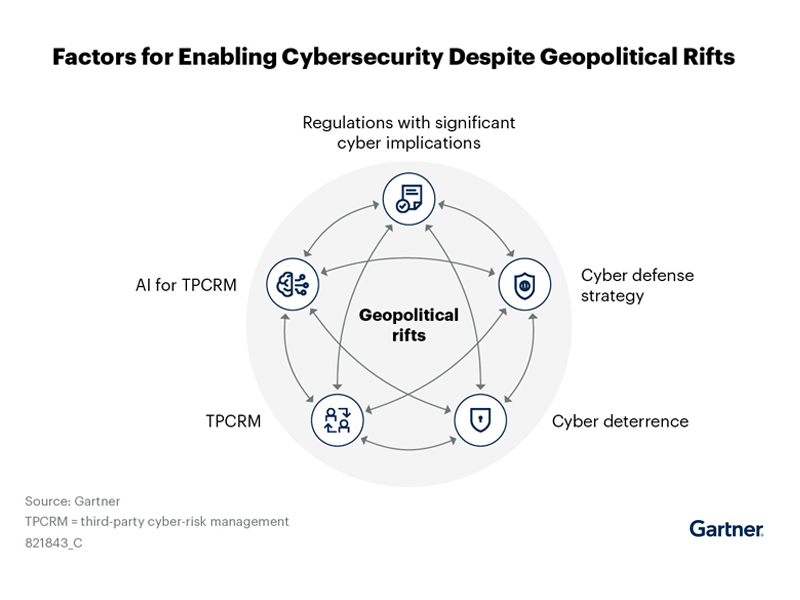Cybersecurity and Geopolitics: Why Choosing Italian Solutions Is a Strategic Move

Amid increasing global uncertainty, companies face growing pressure to protect their IT systems and data assets.
Gartner’s report “Predicts 2025: Enabling Cybersecurity Despite Geopolitical Rifts” highlights how global tensions are reshaping the priorities of CTOs, demanding a more resilient and risk-aware approach.
1. The Impact of Geopolitics on Security Strategies
According to the report, 19% of executives consider geopolitical risk management to be one of the most important investment areas. This is reflected in the growing number of international and national regulations aimed at strengthening digital infrastructure resilience and information security. To adapt, organizations must:
- Integrate geopolitical implications into cybersecurity strategies, monitoring the effects of sanctions, restrictions, or political tensions.
- Adopt business continuity plans that ensure operational resilience during political or economic instability.
- Strengthen security protocols to enhance cyber resilience—the ability to withstand, absorb, and quickly respond to cyberattacks.
2. Cyber Deterrence as a Preventive Measure
The report also emphasizes the role of cyber deterrence—strategies aimed at discouraging attacks before they happen. Rather than reacting after the fact, companies that anticipate threats can:
- Reduce the likelihood of becoming a target.
- Minimize exposure time and the risk of widespread data breaches.
- Demonstrate strong cybersecurity maturity to stakeholders (partners, suppliers, authorities), turning security into a competitive differentiator.
This proactive approach is particularly valuable in highly regulated sectors like finance, healthcare, and advanced manufacturing, where trust and data protection are paramount.
3. Managing Third-Party Cyber Risk
The report also points to the rising importance of Third-Party Cyber Risk Management (TPCRM). As more partners, consultants, and suppliers gain access to critical systems, organizations must:
- Implement robust due diligence processes to verify the security standards of third parties.
- Define shared business continuity plans to coordinate responses to supplier-related incidents.
- Apply compensating controls to reduce risk, even when the extended supply chain has security gaps.
By 2028, over 30% of organizations will prioritize business continuity planning and adopt “emergency access cut-off” measures to quickly contain supply chain threats. This requires balancing openness with strong digital perimeter protection.
4. The Role of Generative Artificial Intelligence (GenAI)
By 2027, 60% of security teams will use GenAI-powered cybersecurity risk management tools to address the growing skills gap. Generative AI brings advanced automation and analytics capabilities that:
- Enhance detection of abnormal behaviors and emerging threats.
- Speed up third-party contract assessments and reviews.
- Improve incident response times, reducing business impact.
Integrating GenAI with threat intelligence tools or monitoring platforms enables scalable protection, particularly in environments with high data volumes and digital interactions.
5. Why Italian Cybersecurity Solutions Matter
For Italian organizations, choosing local cybersecurity technologies and partners offers several strategic benefits:
- Regulatory compliance and data sovereignty: Italian providers are better positioned to meet GDPR and sector-specific requirements, ensuring compliance with local data storage and processing regulations.
- Support for national expertise: Collaborating with Italian companies helps strengthen domestic cybersecurity skills and fosters national ecosystem growth.
- Cultural alignment and faster response: Proximity in language, culture, and geography ensures quicker response times and smoother communication on sensitive security matters.
- Reinforce cyber deterrence and proactive defense strategies.
- Enhance third-party risk management through contingency planning and continuous monitoring.
- Leverage generative AI to boost monitoring effectiveness and decision-making speed.
In this context, choosing Italian cybersecurity solutions like Agger is not just about compliance or data sovereignty—it’s an investment in national security. The ultimate goal is to ensure business continuity, protect critical information, and maintain the global competitiveness of Italian enterprises.